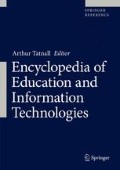Access this chapter
Tax calculation will be finalised at checkout
Purchases are for personal use only
References
Anderson J, McCormick R (2006) Pedagogic quality of e-learning. In: Ehlers U-D, Pawlowski JM (eds) Handbook on quality and standardisation in E-learning. Springer, Berlin, pp 407–421
Austin R, Anderson J (2007) Chapter 6. Connected learning for citizenship. In: E-schooling: global messages from a small island. David Fulton, London
Austin R, Hunter WJ (2013) Online learning and community cohesion: linking schools. Routledge, London
Barnes S.B, et. al. (2001) National Grid for Gearning: Rollout Evaluation of Pathfinder LEAs: Report of Research Activity March 2000 through February 2001. Web publication/site, Retrieved from http://www.becta.org.uk 08.10.2019
BECTA (1998) The UK ILS evaluations – final report. British Educational Communications and Technology Agency, Coventry
CCEA (2018a) Cross-curricular skills: using ICT. http://www.nicurriculum.org.uk/curriculum_microsite/uict_ks1_and_ks2/what_is_UICT/index.asp. Accessed 19 Dec 2018
CCEA (2018b) Thinking skills and personal capabilities. http://ccea.org.uk/curriculum/key_stage_3/skills_and_capabilities/thinking_skills_and_personal_capabilities. Accessed 19 Dec 2018
CCEA (2018c) Digital skills curriculum and qualifications framework. http://ccea.org.uk/sites/default/files/docs/subsites/digitalskills/digitalskills_framework.pdf. Accessed 19 Dec 2018
Cuban L (2001) Oversold and underused: computers in the classroom. Harvard University Press, Cambridge
Digital Skills for the UK Economy (2016) Department for Business, Innovation and Skills and Department for Culture, Media and Sport, London
Fothergill R (1981) The microelectronics education programme strategy. MEP, Newcastle upon Tyne
Gleeson et al (2001) ICT and school improvement. Executive summary for Ireland. OECD/CERI
House of Lords Select Committee on Digital Skills (2015) Make or break: the UK’s digital future. Parliament Publications, London
McDonald B (1977) The educational evaluation of NDPCAL. https://doi.org/10.1111/j.1467-8535.1977.tb00214.x
National Education Network (2018) History of the national grid for learning. http://www.nen.gov.uk/about. Accessed 19 Dec 2018
National Foundation for Educational Research (2000) School improvement through ICT: limitations and possibilities. Peter Rudd. Paper presented at European conference on educational research (ECER) University of Edinburgh
Ofsted (2013) ICT in schools: 2008 to 2011. A report into information and communication technology (ICT) and its effect on achievement and standards in schools, Ofsted, London
Open for Learning, Open for Business (1998) Department for enterprise and employment. White Paper, London
Papert S (1993) Mindstorms: children, computers, and powerful ideas. Basic Books, New York
Passey D (2014) Early uses of computers in schools in the United Kingdom: shaping factors and influencing direction. In: Tatnall A, Davey B (eds) Reflections on the history of computers in education: using computers and teaching about computing in schools from the late 1970s to the early 1990s. Springer, Heidelberg
Author information
Authors and Affiliations
Corresponding author
Editor information
Editors and Affiliations
Section Editor information
Rights and permissions
Copyright information
© 2020 Springer Nature Switzerland AG
About this entry
Cite this entry
Anderson, J. (2020). Computers and Educational Improvement. In: Tatnall, A. (eds) Encyclopedia of Education and Information Technologies. Springer, Cham. https://doi.org/10.1007/978-3-030-10576-1_103
Download citation
DOI: https://doi.org/10.1007/978-3-030-10576-1_103
Published:
Publisher Name: Springer, Cham
Print ISBN: 978-3-030-10575-4
Online ISBN: 978-3-030-10576-1
eBook Packages: Computer ScienceReference Module Computer Science and Engineering

